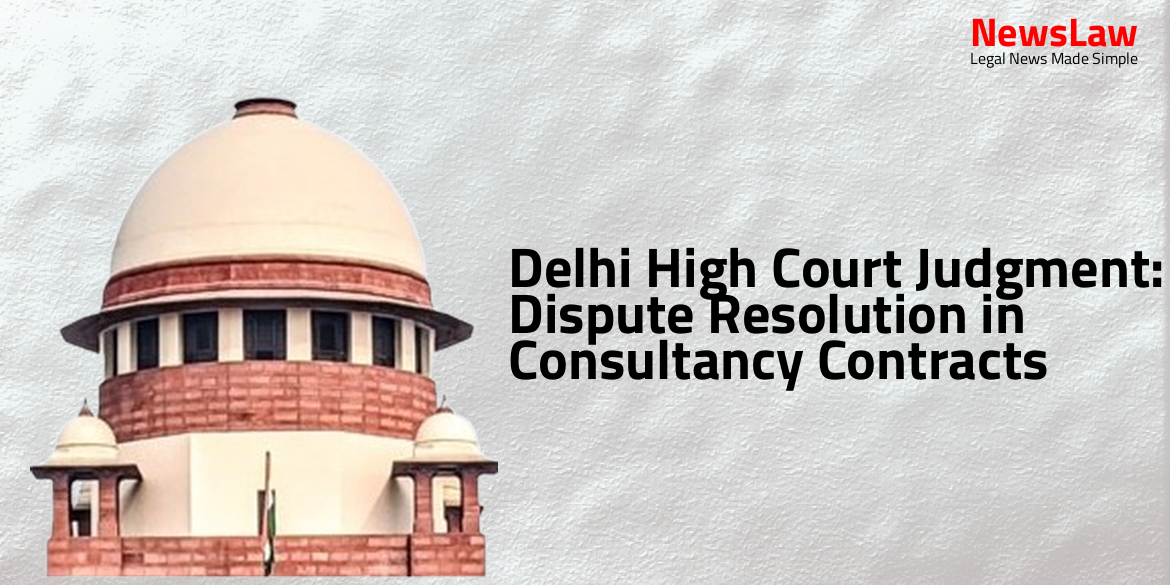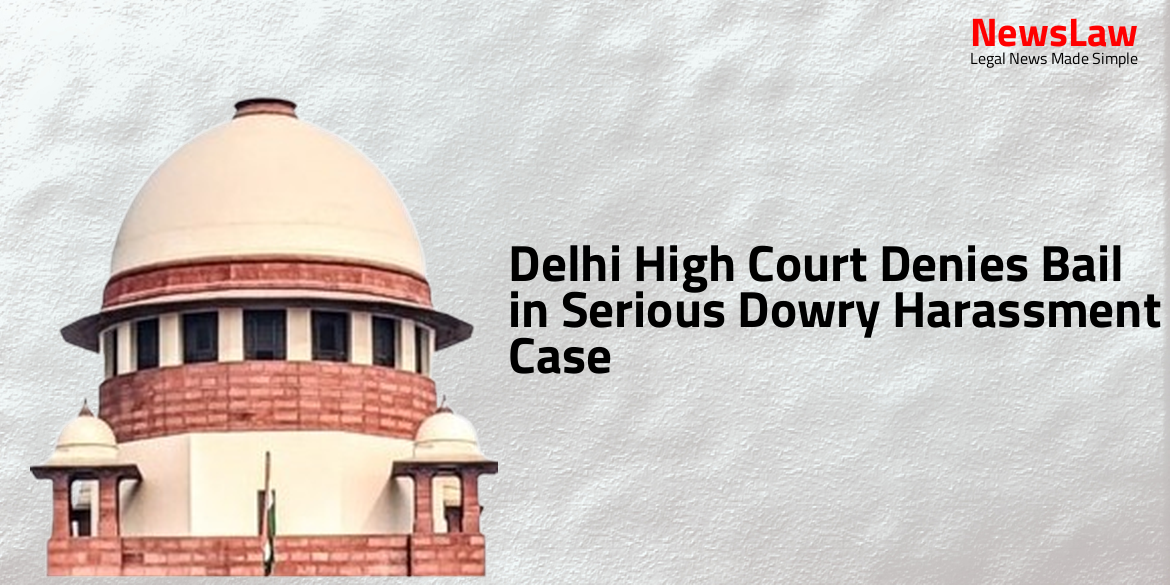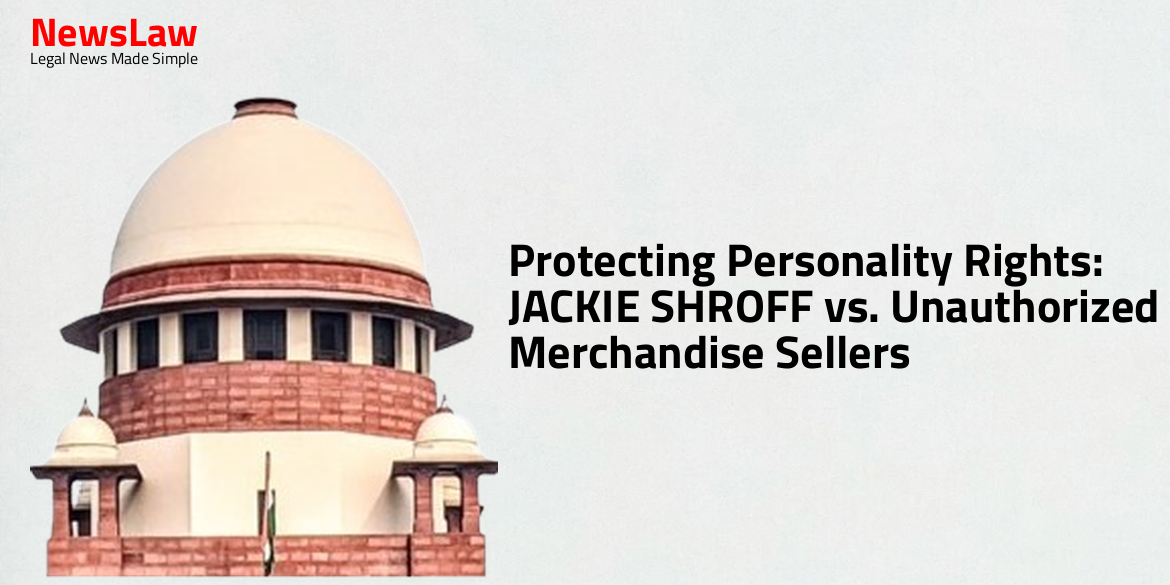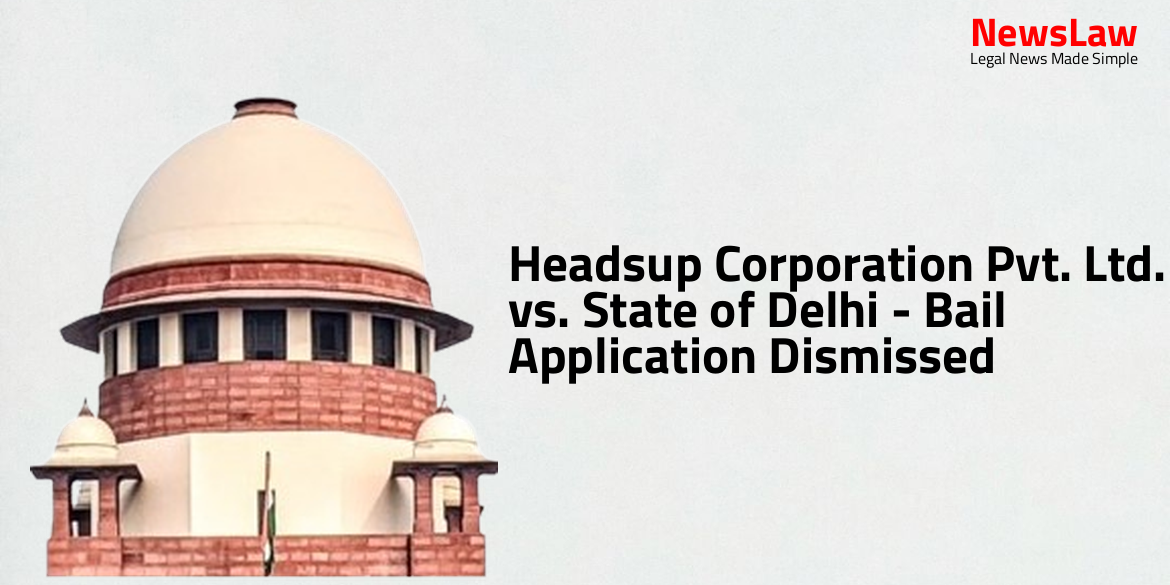The Delhi High Court recently issued a judgment regarding dispute resolution in consultancy contracts. The case involved a dispute between the parties over claims related to married accommodation projects. The court’s decision emphasized the necessity of producing the best evidence to support claims and the implications of failing to do so. The judgment discussed various aspects of the contracts, including project cost enhancement, contract prolongation claims, and enhanced compensation. Let’s delve into the details of this significant legal case.
Facts
- The parties entered into three contracts for consultancy services related to married accommodation projects.
- The disputes regarding claims were referred to arbitration under the three contracts.
- The petitioner’s claims were based on an enhancement in project cost awarded to the contractor.
- The learned Arbitrator rejected all of the petitioner’s claims.
- The claims fell into three categories: additional remuneration due to project cost enhancement, contract prolongation claims, and enhanced compensation based on risk and cost contracts.
- The consultancy charges were connected to the project cost as defined in the contract.
- The petitioner raised various claims including those for additional remuneration, extended Defect Liability period, and amounts wrongly withheld/recovered.
- The contracts in Vizag, Pune, and Ahmednagar had different terms such as fee percentage and estimated project cost.
- The arbitration awards were dated 17.08.2023 and were challenged under Section 34 of the Arbitration and Conciliation Act, 1996.
Arguments
- The petitioner contended that its bid entitled it to a percentage of the enhanced project cost, not the original estimated cost.
- Claims for increased costs during contract execution were raised and supported by evidence.
- The Arbitrator’s characterisation of the claims as arising from prolongation of the contract was disputed by the petitioner.
- Contention was made for the Arbitrator to consider evidence presented rather than solely on insufficiency grounds.
- The petitioner’s additional claims for services rendered during the defect liability period were rejected by the Arbitrator.
- Interpretation of contractual clauses and erroneous rejection of certain claims were contested by the petitioner.
- Article 16 of the Contract regarding fairness and good faith was referred to in arguments to support claim validity.
- The Arbitrator’s reliance on specific clauses to reject certain claims was challenged by the petitioner.
- Evidence presented on rise in Consumer Price Index was cited as a reasonable basis for adjudication.
- Misconception in the award regarding claims arising from project cost enhancement was highlighted.
- The petitioner raised concerns about delay in terminating the contractor’s engagement.
- The progress of construction work by the contractors was deemed poor, leading to delays and work stoppages.
- The petitioner, an experienced consultant, agreed to a fixed fee despite potential project delays.
- The claim for a fee revision was based on an increase in remuneration packages for employees during construction supervision.
- The petitioner’s submission of payment documents was disputed by the respondent.
- The petitioner recommended extending the contractor’s time, which was not believed to be on the respondent’s instructions.
- The petitioner failed to justify claims of proper construction supervision and termination recommendations to the respondent.
- The claims were rejected for lack of documentary evidence and insufficient proof.
- The Arbitrator noted that time overruns were a known possibility when entering the contract.
- The petitioner failed to provide adequate records to support their claims for salary increases due to CPI index rise.
- The claims for services provided beyond the Defects Liability Period were deemed to be the fault of the contractor, not the respondent.
- The details of claimed salary increases for staff were mentioned in Appendix ‘G’ post-award.
- The petitioner’s claims based on CPI rise were not fully addressed in the Arbitrator’s decision.
Analysis
- The burden of proving the quantum of damages was on the petitioner, who failed to provide any evidence other than the CPI index.
- The claimant did not produce sufficient evidence to support their claims for damages and deductions, leading to rejection of the claims.
- The court emphasized the importance of producing the best evidence in a case, and failing to do so may result in drawing adverse inferences against the party withholding evidence.
- The claimant’s claims for damages due to prolongation of the contract were rejected due to lack of sufficient evidence.
- The claimant also failed to prove claims related to variation in service tax by not providing necessary documentary evidence.
- The court upheld the Arbitrator’s findings on insufficient evidence for the claims and lack of relevance of the provided calculations.
- The court noted the importance of factual disputes and reservations on the rights and contentions of the parties in such cases.
- The Consultant’s responsibility and supervision during the project were highlighted, along with the necessity of providing proof for claims and deductions.
- The Arbitrator’s interpretation of contractual terms was deemed rational, and interference was limited unless the construction of the contract was found to be irrational.
- The court reiterated the need for sufficient evidence to prove claims, especially in the absence of supporting documents like bills or proof of staff and payments.
- The rejection of claims was based on the lack of documentary evidence and failure to meet the required standards of proof.
- The Arbitrator’s assessment of evidence and adherence to contractual terms were found to be reasonable and not arbitrary or perverse.
- The court discussed the relevant clauses in the contract, such as those regarding project completion schedule, risk and cost, and consultant responsibilities.
- The assessment of material before the Arbitrator was considered reasonable in arriving at conclusions on liability and responsibility for delays in the project.
- Responsibility of the consultant team in case of contract cancellation
- Joint inventory process with consultant, Project Manager, and contractor representatives
- Recognition of impracticality to provide for every contingency in the contract
- Agreement to operate the contract fairly between the parties
- Commitment to resolving any unfairness in contract operation through mutual agreement
- Dispute resolution through arbitration if mutual agreement cannot be reached
- The National Highways Authority of India (NHAI) entered into a contract with M/s Hindustan Construction Company Ltd for developing a highway project.
- Disputes arose between the parties regarding the project leading to arbitration proceedings.
- During the arbitration, NHAI raised a plea under Section 34 of the Arbitration and Conciliation Act, 1996 before the arbitrator.
- NHAI contended that the claim made by M/s Hindustan Construction Company Ltd was barred by limitation and that certain claims were not enforceable.
- The arbitrator rejected NHAI’s contentions and passed an award in favor of M/s Hindustan Construction Company Ltd.
- NHAI filed objections under Section 34 of the Act before the District Judge, who eventually dismissed the objections.
- NHAI then approached the Gujarat High Court challenging the dismissal of its objections.
- The High Court set aside the arbitral award, which led M/s Hindustan Construction Company Ltd to appeal to the Supreme Court.
- The Supreme Court upheld the arbitral award in favor of M/s Hindustan Construction Company Ltd and stated that NHAI did not succeed in proving their case for setting aside the award.
- The learned Arbitrator conducted a proper exercise in interpreting the contractual clauses.
- It was noted that the petitioner did not provide bills to support their claims of unjustified deductions by the respondent.
- The Arbitrator found that the claims made by the petitioner lacked sufficient evidence.
- Despite the absence of evidence from the respondent, the Arbitrator had the jurisdiction to determine the validity of the claims.
- The contractual clauses were considered ambiguous and in need of construction.
- Interpretative guidance from Article 16 was highlighted, and the benefit of the doubt was not given to the petitioner.
- This Court followed the judgment of the Supreme Court in Asian Techs over Ramnath International Construction (P) Ltd. v. Union of India.
- In Simplex Concrete, contractual clauses preventing damages for delays were deemed void under Section 23 of the Indian Contract Act.
- In NHPC, a distinction was made between claims for damages and claims for reimbursement of costs.
- Salwan Construction involved a non-speaking award under the Arbitration Act, 1940, requiring claims to be supported by evidence.
Decision
- The petition O.M.P.(COMM) 526/2023 and O.M.P.(COMM) 527/2023 are dismissed.
- Costs are to be borne as per the rates quoted in the financial proposal with no extra payable to the consultant.
- The petitioner’s claims regarding Claim Nos. 1, 2, and 3 in the Pune and Ahmednagar cases are rejected.
- All pending applications are disposed of.
- The impugned award is set aside for rejecting Claim Nos. 1, 2, and 3, allowing the petitioner to initiate fresh arbitration for these claims.
- O.M.P.(COMM) 518/2023 is partially allowed for specific reasons mentioned in the judgment.
- Consultant instructed to prepare tender documents as specified and submit them for evaluation.
- The petitioner has the liberty to start new arbitration proceedings for the relevant claims.
Case Title: WADIA TECHNO ENGINEERING SERVICES LIMITED. Vs. DIRECTOR GENERAL OF MARRIED ACCOMMODATION PROJECT & ANR. (2024:DHC:4336)
Case Number: O.M.P. (COMM)-527/2023



